Double direction thrust spherical roller bearings
Bidirectional thrust spherical roller bearing
Brief description:
Designed for heavy-duty bidirectional axial loads, built-in double-row spherical rollers can automatically compensate for shaft deflection (2°-3°), with high load-bearing and self-aligning capabilities.
Typical applications:
Heavy industry: metallurgical rolling mills, vertical mills
Energy equipment: turbines, wind turbine main shafts
Ship propulsion: propeller thrust system
Large transmission: mining machinery, port cranes
Core advantages:
Bidirectional high load: axial load capacity of 5000kN+, far exceeding thrust ball bearings
Intelligent self-alignment: automatically correct installation deflection and reduce edge stress
Impact-resistant design: drum rollers disperse vibration and adapt to harsh working conditions such as mining/metallurgy
Long life: optimized contact stress distribution, L10 life increased by 30%+
Flexible lubrication: supports grease lubrication or high-pressure oil circulation, adapting to high-speed and high-temperature scenarios
Double direction thrust spherical roller bearings technical analysis
Product Overview
Double direction thrust spherical roller bearings is a heavy-duty bearing that can withstand bidirectional axial loads and has an automatic self-aligning function. Its core structure consists of two sets of shaft rings, seat rings and two rows of drum rollers. With the spherical outer ring raceway, it can effectively absorb the centering deviation between the shaft and the bearing seat (the allowable angle error is usually 2°~3°).

Standard technical parameter reference
Item Parameter range Technical description
Aperture range 50–1000mm and above Customized according to load requirements
Outer diameter specification Matching inner diameter and series Non-standard sizes such as 240×420×110mm
Bearing width 50–300mm Width is positively correlated with load capacity
Rated dynamic load 100–5000kN and above Axial dynamic load index
Rated static load 200–8000kN and above Axial static load limit
Maximum speed 200–1000rpm Oil lubrication conditions can increase the speed
Allowable deflection angle ≤2°–3° Automatic compensation for installation deviation
Lubrication method Grease lubrication/circulating oil lubrication Oil lubrication is recommended for high temperature and high speed
Mechanical performance analysis
Load transfer characteristics
The spherical roller and raceway are in optimized contact to achieve uniform load distribution and avoid excessive local stress
Bidirectional axial force is transmitted separately through independent roller rows
Misalignment adaptability
The spherical raceway design can offset the additional bending moment caused by shaft bending or assembly error
Durability evaluation
Dynamic load coefficients must be calculated according to ISO 281 standard to predict fatigue life
Core advantages
Excellent bidirectional pressure-bearing performance: axial load capacity far exceeds that of thrust ball bearings
Intelligent self-aligning function: automatically correct installation deviation and protect supporting components
Strong impact resistance: drum roller structure effectively buffers vibration and is suitable for heavy load impact environment
Extremely long service life: special roller profile design reduces contact stress
Multi-lubrication adaptation: compatible with grease lubrication and pressure oil circulation system

Common brands
SKF Thrust Spherical Roller Bearing Double Direction
NSK Double direction thrust spherical roller bearings
FAG Double direction thrust spherical roller bearings
INA Double direction thrust spherical roller bearings
NTN Double direction thrust spherical roller bearings
KOYO Double direction thrust spherical roller bearings
TIMKEN Double direction thrust spherical roller bearings
Common technical questions and answers
Q1: How to select Double direction thrust spherical roller bearings?
→ This bearing is suitable for scenes with larger axial load, medium and low speed, and requires self-aligning function
Q2: What are the consequences of exceeding the self-aligning angle?
→ A deviation exceeding 3° will cause a surge in stress at the roller end, significantly shortening the service life
Q3: How to monitor the lubrication status?
→ Through temperature (recommended <80℃) and abnormal sound monitoring, oil lubrication is preferred in heavy load and high temperature environment
Q4: Key points for installation?
→ The shaft ring/seat ring must be tightly fitted, and excessive preload is prohibited
Q5: What are the typical failure forms?
→ The main failure modes include raceway damage caused by poor lubrication and cage damage caused by over-angle operation
Typical application areas: large vertical transmission devices, ship propulsion systems, metallurgical rolling mills, port lifting equipment and other heavy machinery that need to withstand bidirectional axial forces and have shaft deformation.
Please see our Thrust spherical roller bearing Catalog for more information!!




